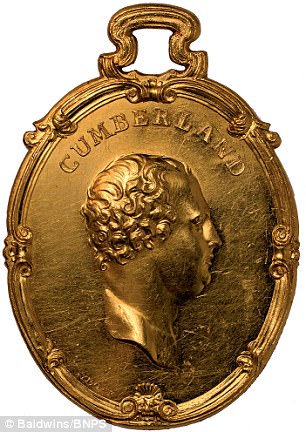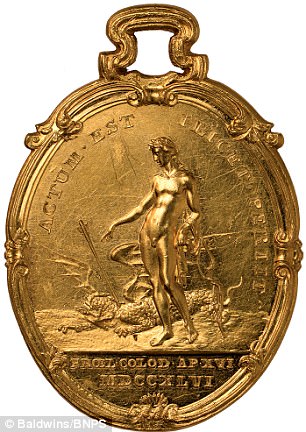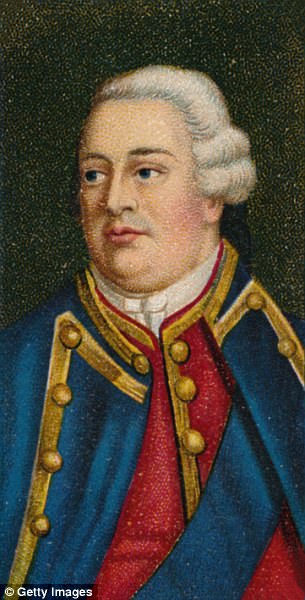A rare medal struck after the Duke of Cumberland's loyalists crushed the Jacobite rebellion in 1746 is tipped to fetch £100,000 at an auction.
The Battle of Culloden, in which 1,500 Jacobites were killed while only 50 government troops lost their lives, was the last pitched battle fought on British soil.
Rare gold medal struck after the Duke of Cumberland's loyalists crushed the Jacobites during the 1746 Battle of Culloden could fetch £100,000 at auction
A rare medal struck after the Battle of Culloden will go on sale at auction
In the battle the Duke of Cumberland's loyalists crushed the Jacobite rebellion
After victory he formed the Cumberland Society to commemorate the triumph
Medals were presented to 26 senior officers and one further member was elected to the society every year until the duke's death in 1766
By Thomas Burrows for MailOnline
4 January 2018
A rare medal struck after the Duke of Cumberland's loyalists crushed the Jacobite rebellion in 1746 is tipped to fetch £100,000 at an auction.
The Battle of Culloden, in which 1,500 Jacobites were killed while only 50 government troops lost their lives, was the last pitched battle fought on British soil.
It was the last of the great Jacobite risings - popular attempts to reinstate a Stuart monarch on the throne of Britain - and was led by Charles Edward Stuart, also known as Bonnie Prince Charlie or the Young Pretender.


The gold medal bears the bust of the duke on one side and a naked Apollo leaning on his bow and pointing to a dragon wounded by his arrow on the other

The Battle of Culloden, in which 1,500 Jacobites were killed while only 50 government troops lost their lives, was the last pitched battle fought on British soil
After the crushing victory the Duke of Cumberland - also known as 'Butcher' Cumberland because of his harsh suppression of the rebellion - formed the Cumberland Society to commemorate the triumph.
Medals were presented to 26 senior officers and one further member was elected to the society every year until the duke's death in 1766.

After the crushing victory the Duke of Cumberland formed the Cumberland Society to commemorate the triumph
The gold medal bears the bust of the duke on one side and a naked Apollo leaning on his bow and pointing to a dragon wounded by his arrow on the other.
Only around 50 medals are believed to have been struck.
The society met annually on April 15, which was the duke's birthday, and the eve of the anniversary of Culloden.
Members were required to wear their medals both at the reunions and also in battle, with the society pledging to meet the cost of a replacement if it was lost in a battle.
Daniel Fearon, consultant at auctioneer Baldwin's of St James's, of London, who are selling the medal, said: 'Fifty or so medals were struck for the society and surprisingly very few of them have survived so this medal is extremely rare.
'You may find a few of them in museums but virtually none are on the private market.
'This medal would be particularly fascinating for anyone interested in Jacobite history.
'It is a beautiful medal with a very good portrait of the Duke of Cumberland.'
The auction takes place in New York on January 14.
CULLODEN: FINAL JACOBITE RISING

The Battle of Culloden was the final confrontation in the Jacobite rising of 1745, which saw Charles Edward Stuart try to regain the British throne for the House of Stuart.
Following the death of Queen Anne, the last Stuart monarch, in 1714, the British government sought to appoint a Protestant successor to the throne, which led to the crowning of George I from the House of Hannover.
After his son George II took the throne in 1727 war broke out between Britain and France as part of the larger War of the Austrian Succession.
Supported by the French, Charles Edward Stuart gathered the support of the Jacobites, who wanted a Catholic king to return to the throne.
In June 1745 he then set sail from Nantes to Scotland. His forces took Edinburgh on 15 September and then marched into England, capturing Carlisle and later Manchester.
However the Jacobite forces were stopped at Derby, forcing Charles to order a retreat while they waited for help from the French.
This help failed to materialise and in April 1746, the Jacobites faced the British Government cannons and muskets across the moor of Culloden.
The Battle of Culloden, in which 1,500 Jacobites were killed while only 50 government troops lost their lives, was the last pitched battle fought on British soil.
Rare gold medal struck after the Duke of Cumberland's loyalists crushed the Jacobites during the 1746 Battle of Culloden could fetch £100,000 at auction
A rare medal struck after the Battle of Culloden will go on sale at auction
In the battle the Duke of Cumberland's loyalists crushed the Jacobite rebellion
After victory he formed the Cumberland Society to commemorate the triumph
Medals were presented to 26 senior officers and one further member was elected to the society every year until the duke's death in 1766
By Thomas Burrows for MailOnline
4 January 2018
A rare medal struck after the Duke of Cumberland's loyalists crushed the Jacobite rebellion in 1746 is tipped to fetch £100,000 at an auction.
The Battle of Culloden, in which 1,500 Jacobites were killed while only 50 government troops lost their lives, was the last pitched battle fought on British soil.
It was the last of the great Jacobite risings - popular attempts to reinstate a Stuart monarch on the throne of Britain - and was led by Charles Edward Stuart, also known as Bonnie Prince Charlie or the Young Pretender.


The gold medal bears the bust of the duke on one side and a naked Apollo leaning on his bow and pointing to a dragon wounded by his arrow on the other

The Battle of Culloden, in which 1,500 Jacobites were killed while only 50 government troops lost their lives, was the last pitched battle fought on British soil
After the crushing victory the Duke of Cumberland - also known as 'Butcher' Cumberland because of his harsh suppression of the rebellion - formed the Cumberland Society to commemorate the triumph.
Medals were presented to 26 senior officers and one further member was elected to the society every year until the duke's death in 1766.

After the crushing victory the Duke of Cumberland formed the Cumberland Society to commemorate the triumph
The gold medal bears the bust of the duke on one side and a naked Apollo leaning on his bow and pointing to a dragon wounded by his arrow on the other.
Only around 50 medals are believed to have been struck.
The society met annually on April 15, which was the duke's birthday, and the eve of the anniversary of Culloden.
Members were required to wear their medals both at the reunions and also in battle, with the society pledging to meet the cost of a replacement if it was lost in a battle.
Daniel Fearon, consultant at auctioneer Baldwin's of St James's, of London, who are selling the medal, said: 'Fifty or so medals were struck for the society and surprisingly very few of them have survived so this medal is extremely rare.
'You may find a few of them in museums but virtually none are on the private market.
'This medal would be particularly fascinating for anyone interested in Jacobite history.
'It is a beautiful medal with a very good portrait of the Duke of Cumberland.'
The auction takes place in New York on January 14.
CULLODEN: FINAL JACOBITE RISING

The Battle of Culloden was the final confrontation in the Jacobite rising of 1745, which saw Charles Edward Stuart try to regain the British throne for the House of Stuart.
Following the death of Queen Anne, the last Stuart monarch, in 1714, the British government sought to appoint a Protestant successor to the throne, which led to the crowning of George I from the House of Hannover.
After his son George II took the throne in 1727 war broke out between Britain and France as part of the larger War of the Austrian Succession.
Supported by the French, Charles Edward Stuart gathered the support of the Jacobites, who wanted a Catholic king to return to the throne.
In June 1745 he then set sail from Nantes to Scotland. His forces took Edinburgh on 15 September and then marched into England, capturing Carlisle and later Manchester.
However the Jacobite forces were stopped at Derby, forcing Charles to order a retreat while they waited for help from the French.
This help failed to materialise and in April 1746, the Jacobites faced the British Government cannons and muskets across the moor of Culloden.
Read more: Rare gold medal struck up for sale at auction | Daily Mail Online
Follow us: @MailOnline on Twitter | DailyMail on Facebook
Follow us: @MailOnline on Twitter | DailyMail on Facebook
Last edited: